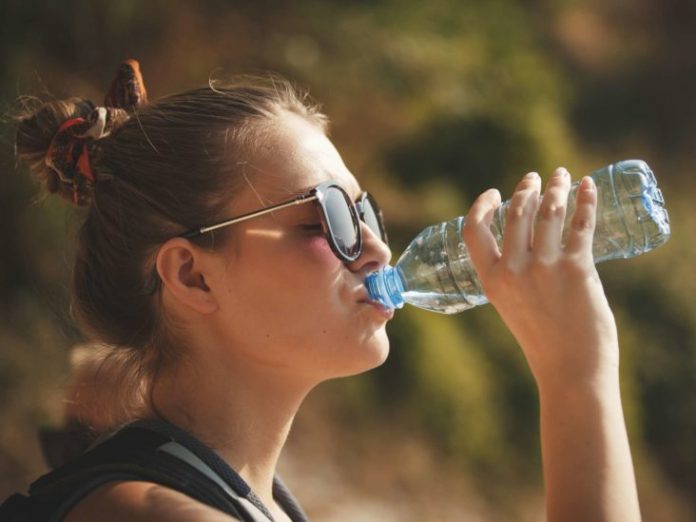The human body reacts to external and internal changes. Body temperature rises when the external temperature increases but also when the internal temperature increases.
Experts consider the normal body temperature to be around 98.6ºFTrusted Source (37ºC), but it can vary by up to 0.9ºF (0.5ºC) depending on the time of day. Average body temperature also differs slightly from person to personTrusted Source.
After intense physical activity or on a hot day, it is common to have a higher-than-normal body temperature. However, a body temperature of above 100.4ºFTrusted Source (38ºC) could indicate fever.
Hot outside temperatures, intense physical activity, illnesses that cause fever, and certain medications can all cause a high body temperature.
In this article, we discuss eight tips for reducing body heat and explain the most common causes of high body temperature.
How to reduce body heat
It is possible to reduce body heat in two different ways: externally or internally.
Jumping into a cool pool is an example of external cooling, while drinking cold water helps reduce body temperature internally.
The human body is always regulating its temperature, and it can lower it in four different waysTrusted Source:
vaporization, which it achieves by sweating
radiation, which means releasing heat into the surrounding air
convection, which occurs when cooler air surrounds the body
conduction, which is the transferral of body heat into adjacent cold water or ice
Tips to reduce body temperature
A brain region called the hypothalamus is responsible for regulating body temperature. It checks the body’s current temperature against its normal temperature and then regulates it.
When the body is too hot, regulation occurs through sweating to cool it down. When it is too cold, the hypothalamus triggers shivering to warm it up.
Although it may seem counterintuitive, eating spicy foods and engaging in activities that cause the body to sweat could potentially make it feel cooler in comparison with the outside temperature. This is because sweating reduces body temperature.
Below are eight tips for reducing body heat:
1. Drink cool liquids
Drinking cool liquids, such as water or iced tea, can help reduce body temperature by cooling the body internally. The regular intake of fluids can also prevent dehydration, which can increaseTrusted Source body heat.
2. Go somewhere with cooler air
People can reduce their body temperature by moving to an area with a cooler external temperature. The body will lose heat by convection.
3. Get in cool water
Swimming in cool water, taking a lukewarm bath, or applying cold water to the body can reduce body temperature. In these cases, body temperature will decrease as a result of conduction.
4. Apply cold to key points on the body
Applying cold water or ice to strategic points on the body where the veins are close to the surface — such as the wrists, neck, chest, and temples — can quickly lower the temperature of the blood running through these veins. This allows the body to feel cooler.
5. Move less
The body releases heat when it moves. In hot temperatures, a person is likely to feel less hot if they avoid heavy exercise and limit their movement.
6. Wear lighter, more breathable clothing
Heat passes more easily through some fabrics than others. Natural fabrics, such as cotton and linen, allow heat to escape from the body more easily than synthetic fabrics, such as acrylic and nylon.
7. Take heat regulating supplements
Depending on the cause of high body temperature, taking a supplement may help regulate body heat.
A 2018 studyTrusted Source that compared plant extracts found that both evening primrose oil and black cohosh were effective in reducing the frequency and severity of hot flashes in people going through perimenopause or menopause.
Black cohosh also reduced the frequency of hot flashes.
Learn more about taking black cohosh during menopause here.
8. Talk to a doctor about thyroid health
At times, high body heat may be due to an overactive thyroid. When this is the case, a person might also notice other symptoms, such as a rapid heart rate, sweating, jaundice, and confusion.
Anyone who thinks that they might have a thyroid issue should speak to a doctor.
Potential causes of feeling hot
The cause of high body temperature can be external or internal. Below, we list some of the main reasons why a person may feel hotter than usual:
Hot environment
Spending time outside in very hot weather can increase a person’s body temperature, as can being in a hot indoor environment for extended periods. Wearing too many layers in either situation can also lead to an increase in body temperature.
Overexposure to sun or heat
Spending too much time in the sun can increase body heat or even lead to heatstroke, which some people call sunstroke.
Children and older adults are particularly at risk of heatstroke. Dehydration from spending too much time in the sun can further increase body heat. Therefore, it is important to drink lots of fluids and to rest after prolonged sun or heat exposure.
Doctors categorize overexposure to heat into three levelsTrusted Source: heat cramp, heat exhaustion, and heatstroke.
Heat cramp, although hard on the body, does not require medical attention. It tends to subside with plenty of rest and rehydration.
The symptoms of heat cramp include:
high body temperature
dizziness
muscle pain or stiffness
Heat exhaustion requires medical attention if the symptoms last for longer than an hour or get worse over time.
In addition to the symptoms of heat cramp, a person may experience:
vomiting
headaches
reduced concentration or impaired judgment
Heatstroke is very serious and requires medical attention at a hospital.
The symptoms of heatstroke include those of heat cramp, as well as:
seizures
difficulty maintaining consciousness
liver failure
Exercise or moving more than usual
When a person moves, they create energy. Heat is the body’s way of releasing energy. To reduce body heat, a person can try temporarily moving less or only when necessary.
Perimenopause or menopause
During perimenopause and menopause, people often experience hot flashes and night sweats, both of which temporarily elevate body temperature.
Medications, hormones, and recreational drugs
Medications and other drugs can raise a person’s body temperature by affecting either heat loss or heat production.
Reducing heat loss
Some medications, including diuretics and anticholinergics, can impair the body’s ability to lose heat by sweating.
Beta-blockers, neuroleptic drugs, inhaled anesthetics, and succinylcholine also decrease the body’s ability to get rid of excess heat.
Increasing heat production
Some medications, hormones, and recreational drugs cause the body to produce excess heat because they increase the metabolic rate. These include:
amphetamines
cocaine
methamphetamines
thyroid hormone, in excess
Being unwell
Body temperature also increases in response to germs such as viruses and bacteria. An increased body temperature helps the body fight off invading illnesses, which is why a fever is often a sign of getting sick.
Thyroid storm
A thyroid storm is an excess of thyroid hormone in the body. It is a life threatening condition that requires immediate medical attention. A thyroid storm may occur after illness, surgery, infection, or pregnancy.
As well as a very high body temperature, symptoms of a thyroid storm includeTrusted Source:
rapid heartbeat
sweating
nausea or vomiting
agitation
jaundice
abdominal pain
Malignant hyperthermia
Malignant hyperthermia is a genetic condition that causes a person to have a severe reaction to certain medications and drugs.
The symptoms include a rapid or irregular heartbeat, a very high body temperature, and severe muscle spasms. People with this condition require immediate medical attention.
Learn more about hyperthermia here.
When to see a doctor
Anyone with a body temperature of 103ºF (39.4ºC) or higher should see their doctor straight away.
Caregivers should take children under 3 months of age to the doctor if they have a rectal temperature of 100.4ºF (38ºC) or higher.
In children older than 3 months of age, a temperature of 102.2ºF (39ºC) or a fever that lasts for longer than 24 hours requires medical attention.
People should visit a doctor if their body heat is higher than usual and they also have any of the following symptoms:
difficulty breathing
irritability, drowsiness, or weakness
a stiff neck
light sensitivity
vomiting
refusing to drink or becoming dehydrated
signs of rash or infection






























